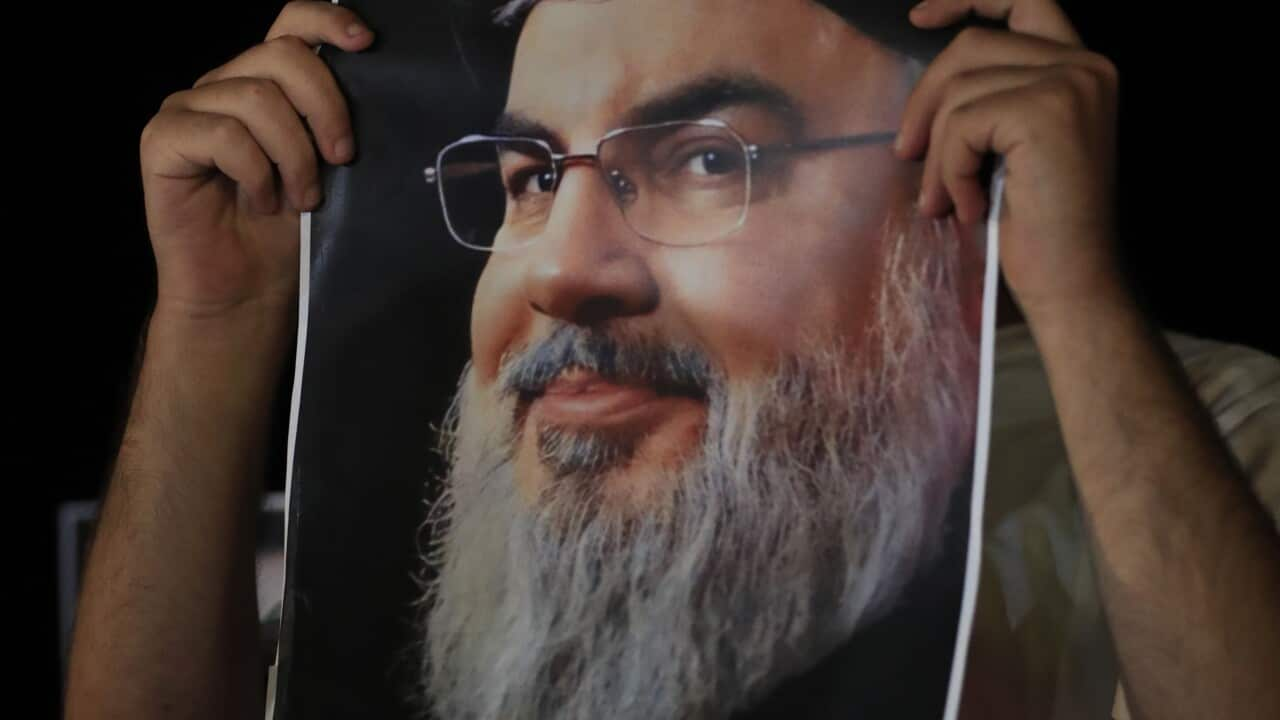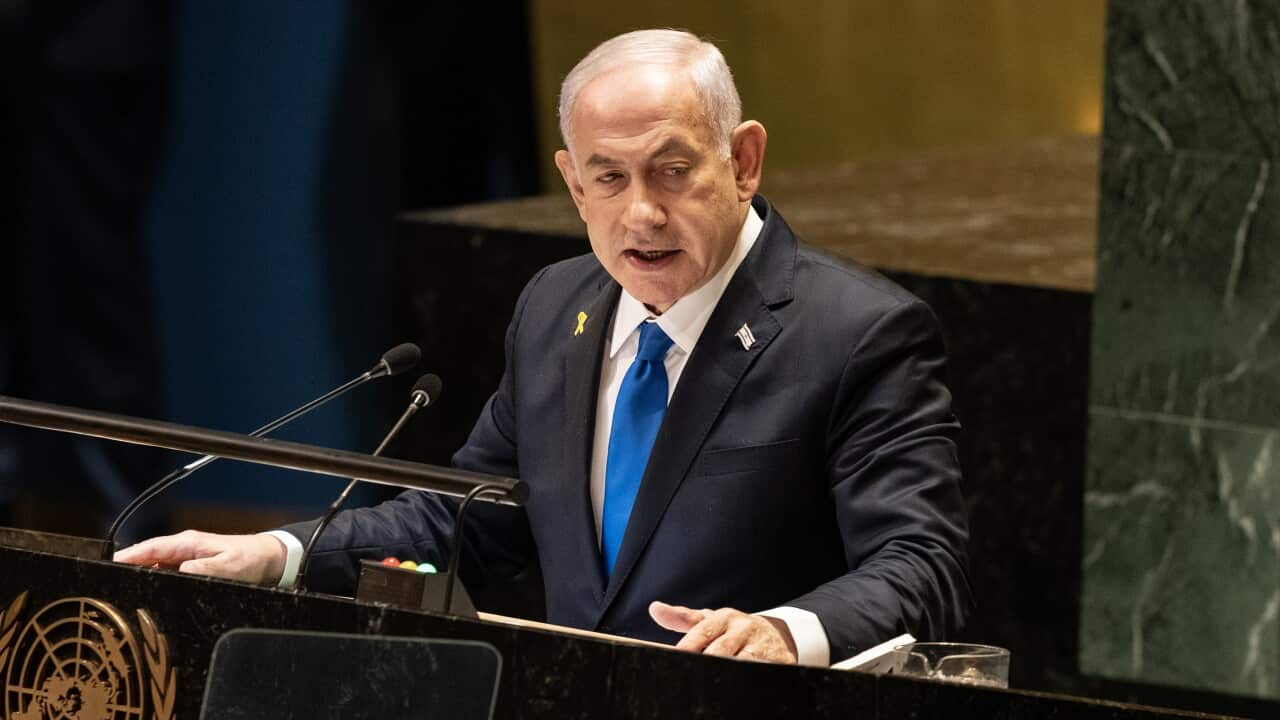Israel has , in what Prime Minister Benjamin Netanyahu called a "turning point" for his country, and the balance of power in the region.
Nasrallah's killing deals a seismic blow to that has been engaged in a year of cross-border hostilities with Israel, sparked by .
Hezbollah confirmed its leader's death on Saturday after Israel's military said he had been killed in an air strike on the southern suburbs of Lebenon's capital Beirut the previous day.
Some Israelis celebrated Nasrallah's killing, while in Lebanon, his supporters' disbelief gave way to anguished mourning.
Around the region, leaders condemned the killing while some Hezbollah allies vowed vengeance, fuelling fears of more violence in the Middle East.
Benjamin Netanyahu: A 'turning point'
Netanyahu said Israel had "settled the score" for the killing of Israelis and citizens of other countries, including Americans.
As long as Nasrallah was alive, he added, he could have "quickly restored the capabilities we had eroded from Hezbollah" in a series of recent operations.
Netanyahu said Israel was on the cusp of "what appears to be a historic turning point" that could change the balance of power in the Middle East.
"Nasrallah was not a terrorist, he was the terrorist," Netanyahu said in a statement.
"Nasrallah's killing was a necessary step toward achieving the goals we have set, returning residents of the north safely to their homes and changing the balance of power in the region for years to come."

Israeli Prime Minister Benjamin Netanyahu said Nasrallah's death was a turning point that could change the balance of power in the region. Source: AAP, AP / Ronen Zvulun
Israeli military spokesperson Daniel Hagari, in a televised briefing, called Nasrallah "one of the greatest enemies of the state of Israel of all time".
He added: "His elimination makes the world a safer place".
Iran's first vice president: 'Unjust bloodshed'
Rarely seen in public, Nasrallah had enjoyed cult status among his Shi'ite Muslim supporters, and was the only man in Lebanon with the power to wage war or make peace.
On the streets of Beirut, supporters were seen weeping as Hezbollah confirmed the news of Nasrallah's death.
In Iran's capital, Tehran, posters of the late leader were erected bearing the slogan "Hezbollah is alive".
Iran's First Vice President Mohammad Reza Aref denounced the "unjust bloodshed" and threatened that Nasrallah's killing would "bring about their destruction", Iran's ISNA news agency quoted him as saying.

Lebanese and Palestinian men hold portraits of the late Hezbollah leader Hassan Nasrallah during a protest in the southern port city of Sidon, Lebanon. Source: AAP / Mohammed Zaatari/AP
Iran's Supreme leader Ayatollah Ali Khamenei declared public mourning, as did Lebanon, Iraq and Syria.
US President Joe Biden: A 'measure of justice'
In a statement issued by the White House, United States President Joe Biden called Nasrallah's death a "measure of justice for his many victims, including thousands of Americans, Israelis and Lebanese civilians".
"The United States fully supports Israel’s right to defend itself against Hezbollah, Hamas, the Houthis, and any other Iranian-supported terrorist groups," Biden said.
"Just yesterday, I directed my Secretary of Defense to further enhance the defense posture of US military forces in the Middle East region to deter aggression and reduce the risk of a broader regional war."
He added: "Ultimately, our aim is to de-escalate the ongoing conflicts in both Gaza and Lebanon through diplomatic means".
LISTEN TO

'Time to get this deal done': Biden administration wants Israel to end the war
SBS News
26/07/202407:27
US Vice President Kamala Harris, who is running to replace Biden in the White House, called Nasrallah a "terrorist with American blood on his hands".
She also reiterated an "unwavering commitment to the security of Israel", saying she "will always support Israel’s right to defend itself against Iran and Iran-backed terrorist groups such as Hezbollah, Hamas, and the Houthis".
Russia condemns 'latest political murder'
Russia's foreign ministry said "we decisively condemn the latest political murder carried out by Israel" and urged it to "immediately cease military action" in Lebanon.
Israel would "bear full responsibility" for the "tragic" consequences the killing could bring to the region, the ministry added in a statement.
French Foreign Minister Jean-Noel Barrot demanded Israel "immediately stop its strikes in Lebanon" and said it was opposed to any ground operation in the country.
France also "calls on other actors, notably Hezbollah and Iran, to abstain from any action that could lead to additional destabilisation and regional conflagration", the foreign ministry said in a statement.
Hamas: A 'cowardly terrorist act'
Hamas called Nasrallah's killing "a cowardly terrorist act".
"We condemn in the strongest terms this barbaric Zionist aggression and targeting of residential buildings," it said in a statement.
Hamas is a Palestinian political and military group, which has governed the Gaza Strip since the most recent elections in 2006.
Its unprecedented October 7 attack on Israel sparked the devastating war in Gaza that drew in fellow Iran-backed groups including Hezbollah.
Hamas-led militants killed 1,200 people, according to Israeli tallies, and about 250 hostages were taken.
Israel's retaliatory military offensive has killed more than 41,000 Palestinians, according to Gaza's health ministry.
Palestinian president Mahmud Abbas offered his "deep condolences" to Lebanon for the deaths of Nasrallah and civilians, who "fell as a result of the brutal Israeli aggression", according to a statement from his office.
UN chief 'gravely concerned' by 'dramatic escalation' in Lebanon
United Nations chief Antonio Guterres said he was "gravely concerned by the dramatic escalation of events in Beirut in the last 24 hours".
Israel has shifted the focus of its operation from Gaza to Lebanon, where heavy bombing has killed more than 700 people, according to Lebanon's health ministry, as cross-border exchanges escalated over the past week.
Most of those Lebanese deaths came on Monday, the deadliest day of violence since Lebanon's 1975-90 civil war.
The Israeli military said it has hit more than 140 Hezbollah targets in Lebanon since Friday night, and continued to strike south Beirut into Saturday,
The latest strikes on Saturday killed 33 people and wounded 195, according to the Lebanese health ministry.












